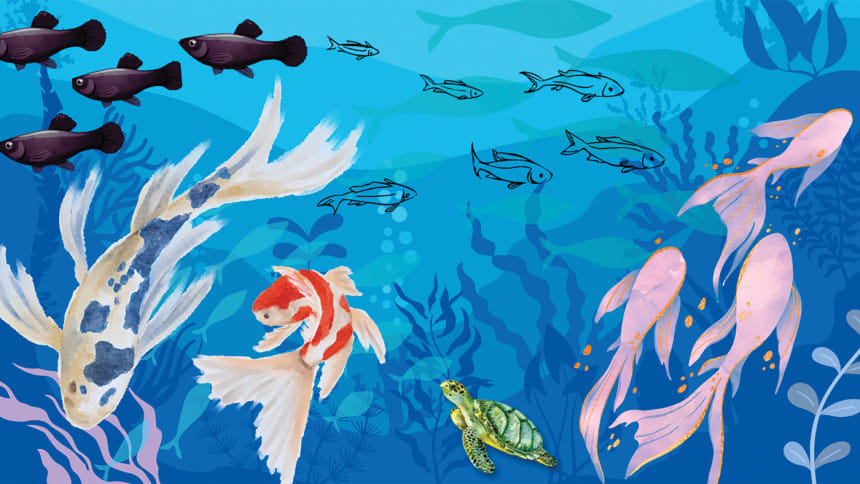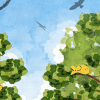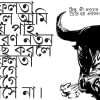Something smells fishy

The large green pond of Dhanmondi Lake was probably the first source of natural water that I had witnessed. It sheltered a huge number of people who have lived, breathed, and grown up beside this lake; the entire Dhanmondi area is intimately connected with its source of life. While half its neighbours lived in the mysticism of the lake, the other half was living in labour.
I was 5 years old when my family had shifted to Dhanmondi. A week after our relocation, I went to see Dhanmondi Lake with Abbu. Never having witnessed a lake or river before, my poor little urban soul was quite excited. As we were approaching Street 32, which was adjacent to the lake, my nose picked up a strange mossy scent. Sensing something unfamiliar, my small fingers tightly clutched into my father's hand. But Abbu started roaming the lakeside with me and my microscopic brain took in the environment surrounding the lake. My four-foot body was left in wonder and the mysterious lake appeared to me with the ocean's might. My little eyes could not even see the end of the lake and suddenly, I started believing the stories of 'mechhobhoot' Dadi used to tell me. I thought, monsters like the mechhobhoot must be hiding under this olive lake.
Eventually, our mindless roaming, the cacophonous crowds of Dhanmondi Lake, and the spicy smell of chotpoti infused with the mossy scent became part of my childhood memory.
After I graduated primary school, Apu brought me a small turtle and we named him Sobuj Mia. Rather quickly, Sobuj Mia became my best friend, though the friendship was quite one-sided. Running back from school, I used to pick him out of his bowl and place him on the table. He seemed perplexed, suddenly finding himself out of the jar. Angrily, he used to run non-stop left and right and bit anything he could with his toothless mouth. During my school days, that was just another one of my heartless entertainment schemes.
While I cherished every second with Sobuj Mia, he didn't seem to enjoy my companionship at all; it seemed he was happier on the days I was late from school. He became more solemn as days passed, and within weeks, I found Sobuj Mia becoming unplayful.
Like all brown parents, at first, I thought he was hungry. I gave him an abundance of food and tried to kill him by overfeeding. Still, I just could not get his attention. In my childish annoyance, I complained to Apu. She smirked and said that food was not the solution to all our problems.
"I think you should set him free. You are still not ready to have a pet, I guess," she said.
"Let him go! Where? Where will Sobuj Mia go?" I screamed in terror.
"Don't panic. He is suffering for his family. All of us do. You must let him go home."
"But he will die…and…and, what will I do without him?"
"I am not asking you to flush him down the toilet. I suggest you free him in Dhanmondi Lake. He may swim back to his family. You must understand that we do not own Sobuj Mia!"
"Okay," I replied in sheer pessimism.
A week later, I went with Apu to the Lake ghaat, just beside Taqwa Masjid. With my right arm, I tightly held a plastic jar full of water, and inside, Sobuj Mia swam aimlessly. I opened the jar and took out Sobuj Mia for the last time. Slowly, I placed him in the olive water of the lake, and I could swear his face turned joyful instantly; slowly, he began to swim in the "ocean" of my childhood. In minutes his dark green shell had become invisible in the olive water. He never even said goodbye.
Spring and winter had come hand in hand and I never saw Sobuj Mia again. But as I grew up, my connection with the lake grew deeper and I developed an almost mystical link with the Tilapias and Ruis, and the plankton. The Shalik and Doel became my pals, while the Mahagoni and Mango trees were my hide-outs on the days that I bunked school. Even after all this time, I liked to believe that Sobuj Mia finally swam across the lake, found his family, made friends with the Ruis and Tilapias, and like all other fairy tales, lived happily ever after. In this almost religious belief, I grew up in solace and serenity.
27 monsoons had passed since that time and countless raindrops had flown into the green waters of the lake. In the endless cycle of the planet, my small fingers grew heavy and strong. In so many ways, they were also scarred and harsh like the rainless dry fields of summer. I grew busy and heavy; my life stuck in the mindless rotation of time. Now, every evening after office, I ran along the lakeside with my swollen body, keeping a strict eye on the pedometer.
***
On an unusual August evening, I was running around the lake when I smelled something fishy. The odour spread fast and my nose couldn't help but scrunch up. Over the hardcore metal song blaring in my ears, I heard shouts that the fish were dead.
"Look! The lake is floating with dead tilapias and ruis. Someone poisoned the entire water bodies," the crowd stated in panic.
Street kids jumped inside the lake to collect the dead fish for their families and within minutes, the place turned into a snake-pit. The last light of dusk revealed the sparkle of a thousand glimmering silver bellies floating around the lake. It was the evening of the Fish Massacre of August and it left with a rotten fishy smell floating in the air.
The lean child inside me hopped a little and I hurriedly started to look for any floating dead turtles in the lake. But I saw only the dead fish—no sign of any turtle. As a rational adult, however, I knew that Sobuj Mia was probably dead long before the massacre. Even if he had lived all this time, he probably died from the poison that killed thousands of his friends. Yet, the child inside me was adamant. The way my brain deceived me for the last 27 monsoons, the inner child tricked me again into believing that Sobuj Mia somehow survived all the same–he was alive and well, gathering his friends and family to lead a revolution against the Fish Massacre of August in Dhanmondi Lake.
K.M. Arefin is a passionate writer and poet. He is a faculty member at Bangladesh University of Professionals and is a researcher of Postcolonial Bengali Literature. Reach him at [email protected].

 For all latest news, follow The Daily Star's Google News channel.
For all latest news, follow The Daily Star's Google News channel. 






Comments